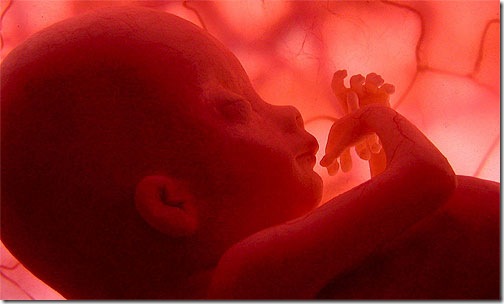Hindu scriptures and tradition from the earliest times have condemned the practice of abortion, except when the life of the mother is in danger. Hindu scriptures refer to abortion with the terms garbha batta (womb killing) and bhrUNaghna (killing the undeveloped soul or embryo slayer).
Hinduism has traditionally taught that a soul is reincarnated and enters the embryo at the time the embryo is conceived. According to the Caraka Samhita, a Hindu medical text, the soul is already joined with matter in the act of conception. The soul is described as descending “…into the union of semen and (menstrual) blood in the womb in keeping with the (karmically produced) psychic disposition (of the embryonic matter).” In Rig Veda Samhita Visnu is called “protector of the child-to-be”, implying that the fetus was deserving of even divine reverence.
The Garbha Upanishad, however, claims that ensoulment takes place in the seventh month, but this view is not generally part of mainstream Hindu thought.
In the Hindu context, the purpose of life as a human being is to make progress toward liberation from rebirth. The most important thing for each soul is the unfolding of its karmic destiny toward this goal. Abortion can obstruct this unfolding, and therefore it is condemned.
One of the seven legendary immortals or Chiranjeevin in Hinduism, Ashwatthama, was cursed by Lord Krishna, avatar of Vishnu to immortality and eternal suffering partly for killing the fetus, later born as Parikshit, grandson of Arjuna when he was in his mother’s womb. Parakashit was born stillborn but was raised from the dead by Shri Krishna.
A compilation of what Hindu scriptures say on abortion may include:
Vedas
The Satapatha Brahmana compares the reputation of those who eat beef with those who perform abortions, while in the Upanisads they are placed in a category with thieves and outcastes.
A Rig Vedic hymn [7.36.9, RvP, 2469] begs for protection of fetuses:
“May this our song of praise reach you, O Maruts, and Visnu guardian of the future infant. May they vouchsafe the singer strength for offspring. Preserve us evermore, ye Gods, with blessings.
Atharva Veda
The Atharva Veda (6.113.2 HE, 43) lists the fetus slayer, bhrUNaghna, among the greatest of sinners (6.113.2).
“Enter thou after the beams, the smokes, O evil; go unto the mists or also the fogs; disappear along those foams of the rivers: wipe off difficulties, O Pushan, on the embryo slayer.” VI-113.2
“With what bonds the overslaughed one is bound apart, applied and tied up on each limb – let them be released, for they are releasers; wipe off difficulties, O Pushan, on the embryo slayer.” VI-112.3
Upanishads
The Kaushitaki Upanishad (1.2 UpR, 774) describes abortion as equivalent to killing one’s parents.
Puranas
The later smrti texts also contain injunctions against abortion, as well as protections for pregnant women. In the Visnudharmasutra, killing either fetus or mother is equated to the worst crime possible in Hindu society, killing a Brahman:
“Killing a Kshatriya [knight] or a Vaishya [Merchant] engaged in sacrifice, a menstrating woman, a pregnant women…[and]..the embryo (even) of a stranger is tantamount to killing a Brahmin [Priest].”
Ferrymen and toll-collectors are prescribed punishment for collection from pregnant women. The Mahabharata, likewise, lists expectant mothers among a group that one must “give way to” that includes Brahmin, cows, and kings.
The Vishnu Purana describes consciousness in the womb:
“An individual soul (jantu), possessing a subtle body (sukumaratanu), resides in his mother’s womb (garbha), which is imbued with various sorts of impurity (mala). He stays there being folded in the membrane surrounding the foetus (ulba). . . He experiences severe pains. . . tormented immensely by the foods his mother takes. . . incapable of extending (prasarana) or contracting (akuncana) his own limbs and reposing amidst a mud of faeces and urine, he is in every way incommoded. He is unable to breathe. Yet, being endowed with consciousness (sacaitanya) and thus calling to memory many hundreds (of previous) births, he resides in his mother’s womb with great pains, being bound by his previous deeds.”
The Puranas’ prophecy for Kali Yuga states,
“Everyone will be miserable owing to the dominance of vice and Tamoguna; people will freely commit abortion. Earth will be valued only for her mineral treasures. Money alone will confer nobility. Power will be the sole definition of virtue. Pleasure will be the only reason for marriage. Lust will be the only reason for womanhood. Falsehood will win out in disputes.”
Other Texts
In the Apastamba dharma sutra (“Sacred-Law-Book of Apastamba)–written by a successor-prophet of Krishna–it reads:
“Now these lead to a fall from caste: stealing…murder…abortion, sexual union with women with whom one is related maternally or paternally…”
The Gautama Dharma Shastra (3.3.9 HD, 214) considers such participants to have lost caste.
The Sushruta Samhita, a medical treatise (ca 100), stipulates what is to be done in case of serious problems during delivery (Chikitsasthana Chapter, Mudhagarbha), describing first the various steps to be taken to attempt to save both mother and child.
“If the fetus is alive, one should attempt to remove it from the womb of the mother alive…” (sutra 5). If it is dead, it may be removed. In case the fetus is alive but cannot be safely delivered, surgical removal is forbidden for “one would harm both mother and offspring. In an irredeemable situation, it is best to cause the miscarriage of the fetus, for no means must be neglected which can prevent the loss of the mother” (sutras 10-11).
A slayer of an embryo is like the slayer of a priest.
— Krishna Yajur Veda 6.5.10
Prajathanthum Ma Vyavathchethsehi
Do not cut the thread of progeny!
— Taittreya Upanishad I-xi-1
The mother is the first letter. The father is the last letter. The progeny is the focal point. Procreation is the link.
— Taittreya Upanishad I-iii-2-4
From The Mahabharata
Anusasana Parva, Section LXI
Addressing King Yudhishthira, Bhishma said:
There are no men more sinful than those upon whose food children look with wistfulness without being able to eat them duly. If within thy kingdom any learned Brahman languishes with hunger like any of those children, thou shalt then incur the sin of foeticide for having allowed such an act.
From The Mahabharata
Santi Parva, Section CLXV
Addressing King Yudhishthira, Bhishma said:
One guilty of foeticide becomes cleansed if he dies of wounds received in battle fought for the sake of kine (cow) and Brahmanas. He may also be cleansed by casting his person on a blazing fire.
From the Mahabharata
Santi Parva, Section XV
There is no act that is wholly meritorious, nor any that is
wholly wicked. Right or wrong, in all acts, something of both is seen.
Arjuna said: He that takes up a weapon and slays an armed foe advancing against him, does not incur the sin of killing a foetus, for it is the wrath of the advancing foe that provokes the wrath of the slayer.



































3 Comments